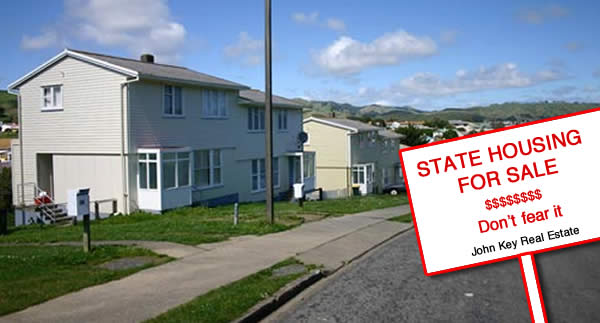John Key’s state of the nation speech promised to sell off state houses (1,000-2,000 this year, 8,000 by 2017) and boost the number of social housing subsidies. This has prompted the usual bleats from the political left, but we needn’t be worried. The voluntary sector has a good record of running social housing overseas, and if this reform is done well it could do the same here.
Why is it Government’s job?
The first question we have to ask is why is it the Government’s job to provide state housing at all. Affordability isn’t the reason – the Government already spends the better part of $2b on the accommodation supplement and income-related rents. Key has promised to increase this spend by around $40m per year. This is not to mention all the lollies Labour and National have thrown at the middle class in recent years to help buy their first home (through Kiwisaver).
The only reason that the government might want to provide state housing is because we are worried about private landlords ripping off the needy. That is absolutely something to be concerned about, but is ultimately an issue for how we regulate the sector – making sure that tenants have sufficient protection against poor conditions or exorbitant rent rises. It doesn’t mean the government needs to own homes. The intention to transfer houses to a ‘social housing’ sector – such as charities like Salvation Army or even iwi – should also help quell concerns. Any profits from rent would be reinvested in improving housing or otherwise helping the people that need it.
Slumdog millionaires – the $1m state house
New Zealand has more than 25 state houses worth over a million dollars. Every time their value goes up, Bill English scratches his head and wonders, ‘How the hell did that happen?’
The answer is that for a long time the focus of state housing was to ‘pepper pot’ – spread housing out amongst communities. The intent was to mix the needy in communities with other ordinary Kiwis – and presumably avoiding the ‘slum’ tag that might get attached to large areas of state housing.
As a result Housing New Zealand has some houses in sought-after inner city Auckland suburbs where the land alone is worth more than a million dollars.
Housing New Zealand
Housing New Zealand is the country’s biggest landlord – with around 70,000 properties housing over 200,000 people. With a total value of $15 billion it is the Government’s second largest asset. Around 6,000 people are on the waiting list for a state house, which has prompted the latest attempt to get rid of tenants who can afford to pay market rents; this tenancy review has so far budged a piffling 32 families.
We call this housing an ‘asset’ but it isn’t really. It doesn’t generate anything like the income it could – despite the soaring capital values, Housing New Zealand still asks for cash injections to upgrade the dilapidated housing stock. The total bill has been estimated at $2b. Its houses don’t even reflect the modern housing demand – they are the wrong size in the wrong place.
The money tied up in Housing New Zealand assets could almost certainly be used more effectively – either by building medium density housing or by selling the property and using the proceeds elsewhere.
Other providers can do better
The UK experience shows that using voluntary sector providers can bring in new investment to the sector, to speed up the pace of change. These providers are not-for-profit and regulated. They have more freedom than the government to make the changes in housing stock that are needed. It’s not like these guys are going to strip the assets and make a mint – they simply want to meet the needs of their clients as best they can. Since setting them up, UK eviction rates are lower, and tenant satisfaction is higher.
More importantly, having other providers running social housing has helped other countries deliver on the goal of joining up social assistance. This is the Whanau Ora problem of ‘five cars in the driveway’ where a bunch of different government agencies are all trying to work with the same family. Housing really is at the centre of people’s lives, so doing it well means we can get many other benefits such as reduced crime, improved health and better communities.
At the very least, voluntary providers should be on the same footing as Housing New Zealand, so that they can have a fair go. Then, as voluntary providers are given a chance to prove themselves, it makes sense to gradually transfer Housing New Zealand assets to the providers that are doing a good job.
Geoff Simmons & Gareth Morgan

